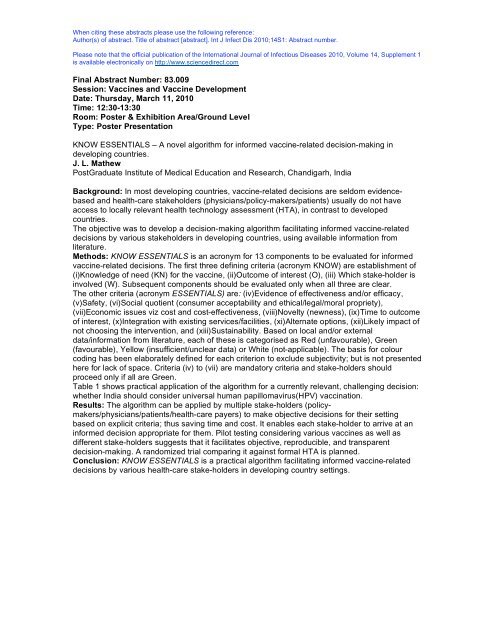14th ICID - Poster Abstracts - International Society for Infectious ...
14th ICID - Poster Abstracts - International Society for Infectious ...
14th ICID - Poster Abstracts - International Society for Infectious ...
Create successful ePaper yourself
Turn your PDF publications into a flip-book with our unique Google optimized e-Paper software.
When citing these abstracts please use the following reference:<br />
Author(s) of abstract. Title of abstract [abstract]. Int J Infect Dis 2010;14S1: Abstract number.<br />
Please note that the official publication of the <strong>International</strong> Journal of <strong>Infectious</strong> Diseases 2010, Volume 14, Supplement 1<br />
is available electronically on http://www.sciencedirect.com<br />
Final Abstract Number: 83.009<br />
Session: Vaccines and Vaccine Development<br />
Date: Thursday, March 11, 2010<br />
Time: 12:30-13:30<br />
Room: <strong>Poster</strong> & Exhibition Area/Ground Level<br />
Type: <strong>Poster</strong> Presentation<br />
KNOW ESSENTIALS – A novel algorithm <strong>for</strong> in<strong>for</strong>med vaccine-related decision-making in<br />
developing countries.<br />
J. L. Mathew<br />
PostGraduate Institute of Medical Education and Research, Chandigarh, India<br />
Background: In most developing countries, vaccine-related decisions are seldom evidencebased<br />
and health-care stakeholders (physicians/policy-makers/patients) usually do not have<br />
access to locally relevant health technology assessment (HTA), in contrast to developed<br />
countries.<br />
The objective was to develop a decision-making algorithm facilitating in<strong>for</strong>med vaccine-related<br />
decisions by various stakeholders in developing countries, using available in<strong>for</strong>mation from<br />
literature.<br />
Methods: KNOW ESSENTIALS is an acronym <strong>for</strong> 13 components to be evaluated <strong>for</strong> in<strong>for</strong>med<br />
vaccine-related decisions. The first three defining criteria (acronym KNOW) are establishment of<br />
(i)Knowledge of need (KN) <strong>for</strong> the vaccine, (ii)Outcome of interest (O), (iii) Which stake-holder is<br />
involved (W). Subsequent components should be evaluated only when all three are clear.<br />
The other criteria (acronym ESSENTIALS) are: (iv)Evidence of effectiveness and/or efficacy,<br />
(v)Safety, (vi)Social quotient (consumer acceptability and ethical/legal/moral propriety),<br />
(vii)Economic issues viz cost and cost-effectiveness, (viii)Novelty (newness), (ix)Time to outcome<br />
of interest, (x)Integration with existing services/facilities, (xi)Alternate options, (xii)Likely impact of<br />
not choosing the intervention, and (xiii)Sustainability. Based on local and/or external<br />
data/in<strong>for</strong>mation from literature, each of these is categorised as Red (unfavourable), Green<br />
(favourable), Yellow (insufficient/unclear data) or White (not-applicable). The basis <strong>for</strong> colour<br />
coding has been elaborately defined <strong>for</strong> each criterion to exclude subjectivity; but is not presented<br />
here <strong>for</strong> lack of space. Criteria (iv) to (vii) are mandatory criteria and stake-holders should<br />
proceed only if all are Green.<br />
Table 1 shows practical application of the algorithm <strong>for</strong> a currently relevant, challenging decision:<br />
whether India should consider universal human papillomavirus(HPV) vaccination.<br />
Results: The algorithm can be applied by multiple stake-holders (policymakers/physicians/patients/health-care<br />
payers) to make objective decisions <strong>for</strong> their setting<br />
based on explicit criteria; thus saving time and cost. It enables each stake-holder to arrive at an<br />
in<strong>for</strong>med decision appropriate <strong>for</strong> them. Pilot testing considering various vaccines as well as<br />
different stake-holders suggests that it facilitates objective, reproducible, and transparent<br />
decision-making. A randomized trial comparing it against <strong>for</strong>mal HTA is planned.<br />
Conclusion: KNOW ESSENTIALS is a practical algorithm facilitating in<strong>for</strong>med vaccine-related<br />
decisions by various health-care stake-holders in developing country settings.
















